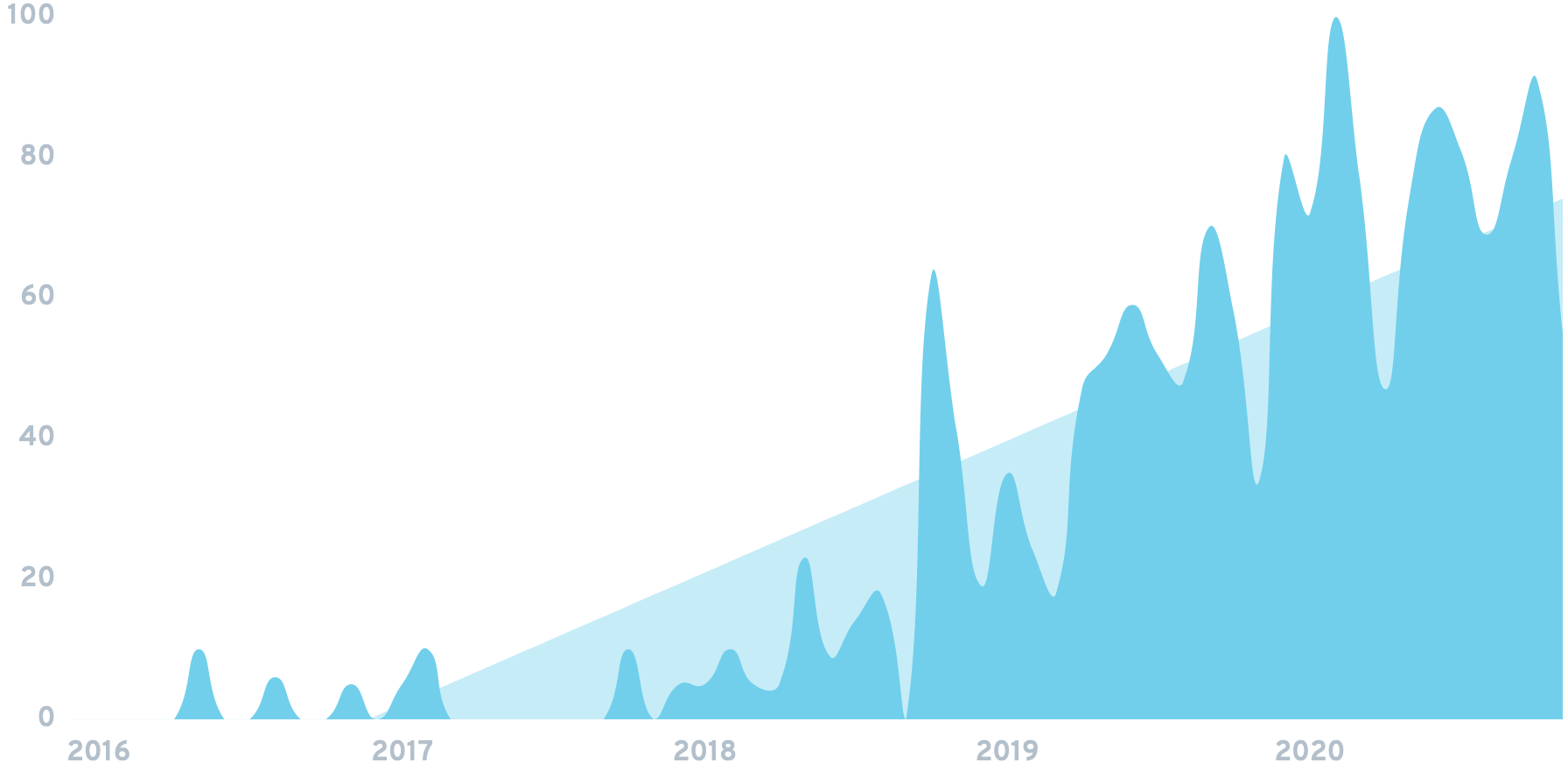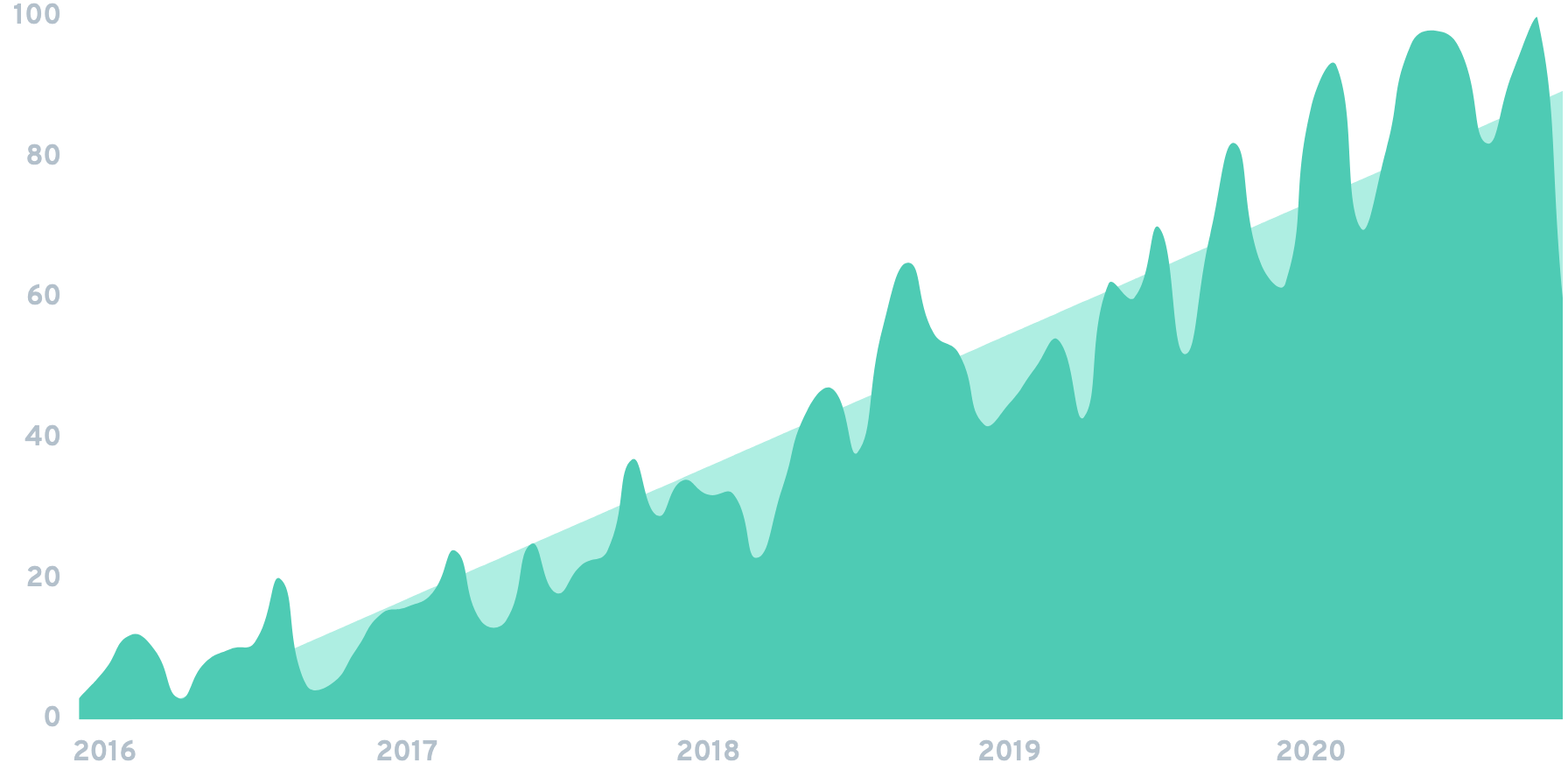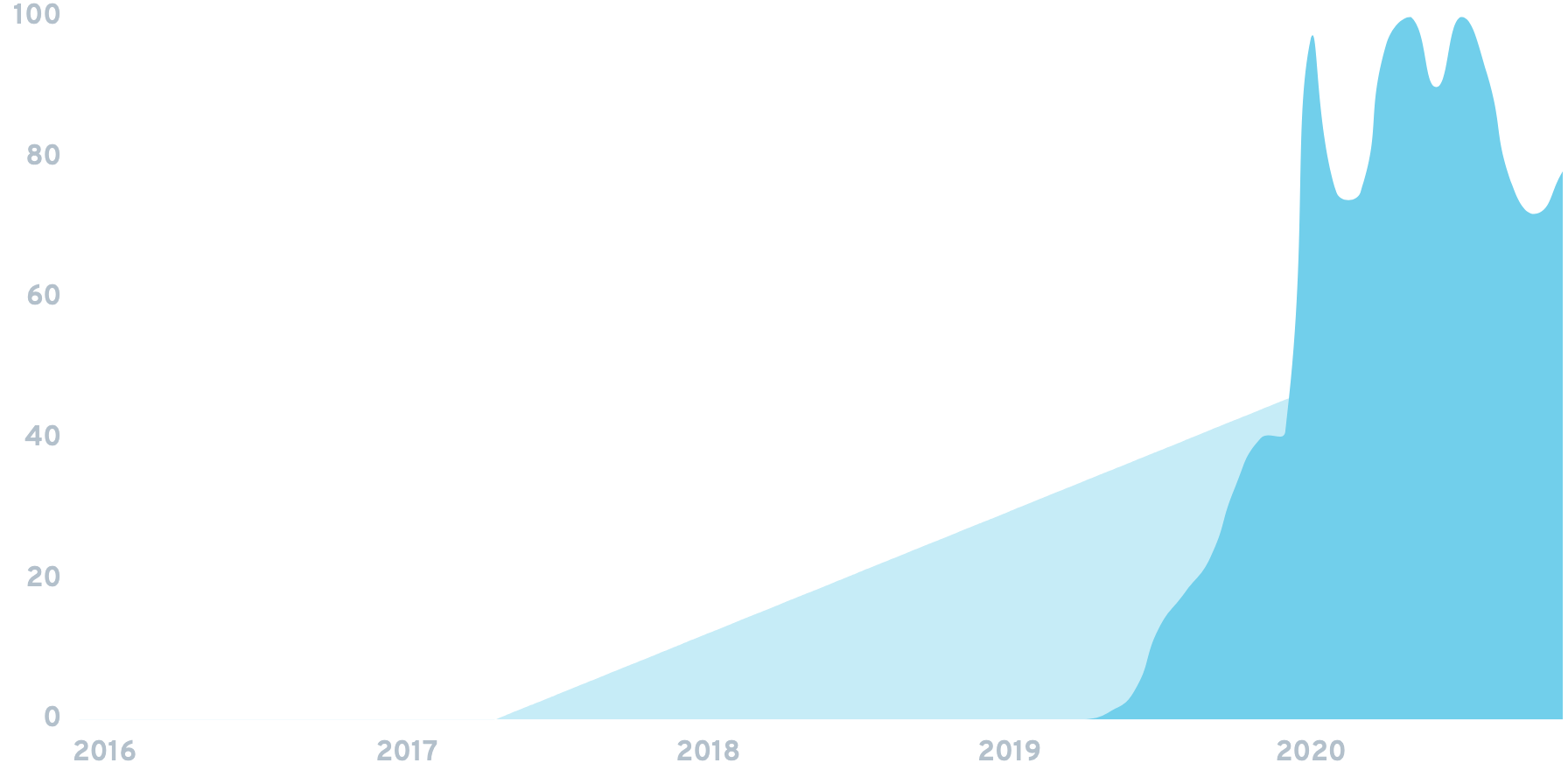How to Sell Shovels in the Podcasting Gold Rush
(from the latest issue of the Indie Hackers newsletter)
Channing here. So Prince Harry and Meghan Markle just inked an exclusive deal with Spotify to launch their own podcast. This caps off what I'll call "the year of the podcaster."
Why "podcaster" and not simply "podcast?" Because the number of new hosts and the number of new listeners have moved in opposite directions:
Or at least that was the case back in the summer. But those numbers are balancing out again. So below, we'll dive into why 2021 might be — simply — the year of the podcast. And how you can take advantage.
Here's what you'll find in this issue:
- Podcasts are booming. Here's the case for taking up the mic (or becoming a mic distributor) if you're an indie hacker.
- Micro everything: learn about two software trends we'll be talking about for years to come.
- Stop overthinking your landing page. Marketing expert Harry Dry has a five-step formula for maximizing your conversions.
- Does winter get you down? Founder Tracy Osborn shares a story of overcoming both seasonal affect and the closing of her first business.
🎙 We're in a Podcasting Gold Rush. Is It Time to Start Selling Shovels?

from the Indie Airwaves newsletter by Nicky Milner
Podcasting is projected to expand exponentially over the next few years. For maximizing your success in the space, the smart money's on building the supporting tools and platforms, instead of trying to be the next superhero content creator.
Many podcasts have seen audience numbers fall off recently due to the coronavirus pandemic (no more commuting time!). But there are good reasons to be optimistic. Mubashar Iqbal (@mubashariqbal), a prolific indie hacker with nearly 100 different projects under his belt, joined Courtland on the Indie Hackers podcast to discuss why he's bullish on the growth trajectory of podcasting.
In Mubashar's view:
In the podcast space, we're at the equivalent of the startup phase of Netflix in terms of growth opportunity.
Being a podcaster can be stressful, even if it's a labor of love for the founder. The relentless schedule of preparing great content can be difficult to sustain. Finding and securing a committed audience can be a long slog through social media or cold list targeting. Advertising revenue generation can be challenging for newer entrants. Plus, some fields are fairly crowded, especially in topics dealing with the tech industry. So interested indie hackers have choices to make, which may be influenced by their startup funding options:
- Create content (simplest for solo founders)
- Build tools for content creators (small bootstrapping teams)
- Build platforms for content creation and distribution (VC-track)
Why are people so confident about the future of podcasting? Reviewing the deals space gives us some indications.
Spotify has recently been on a roll-up acquisition binge to consolidate content creators and to leverage their audio platform. Gimlet Media and Barstool Sports are creating their own media empires by gathering several different shows under one brand. Even Andrew Chen of Andreessen Horowitz anticipates a "massive increase in audio innovation will rival what we've seen for video apps over the past few years."
There are several current hot developments percolating in the podcast and audio space as well, such as:
- Better content creation and management solutions.
- Improved advertising management approaches.
- New tools to help with audience attraction and management.
- The "bundling" of content creators for economies of scale is tracking with similar movements in Youtube and TikTok creation communities.
Notwithstanding, the tools space is still far from saturated. The companies serving up content-creation tools are all generally doing well, with essentially similar product offerings. There are still lots of opportunities for innovative ideas that play into the maturation that's taking place.
Mubashar Iqbal has already staked out some ground with his active projects, aiming to make it easier for people to start, host, and promote their podcasts. To wit:
- Podcast Review, a review site for podcast hosting and applications.
- Podhunt, a site for curating the best new episodes.
As Mubashar puts it:
If you can make money doing something, then you can make money teaching other people to do that same thing.
Discuss this story, or subscribe to Indie Airwaves for more.
📰 In the News
🔌 Google went down, leaving indie hackers locked out of Google Suite, Gmail, and YouTube.
💰 Marc Köhlbrugge explained how he grew BetaList, a directory of new startups, to almost $1M revenue in 10 years.
✍️ Marketing expert Julian Shapiro wrote a viral tweet on how the best copywriting shows problems and solutions.
🎯 "Don't set goals" is the advice from Gumroad's Head of Product. See what indie hackers think of this.
🗞 Newsletter Crew, a paid community, blog, and podcast for newsletter writers, won Product of the Day on Product Hunt.
🧨 "Micro Everything": The Developer Trend We'll Discuss for Years to Come

from the Exploding Topics newsletter by Josh Howarth
Exploding Topics scours the internet to find emerging trends before they take off. Here I'll cover the latest developments from the "micro everything" trend in software development, as well as some insights from a market that's expected to grow from $2.4B today to $10.3B by 2025.
1. Micro Frontend

"Micro frontend" refers to front-end app development that's broken up into independent chunks.
For example, an e-commerce website can be split into development silos for landing page, search, product pages, and checkout. Each part can then be updated, tested and improved with independent tech stacks.
Micro frontends can help to efficiently scale up feature rollouts. As a result, searches for "micro frontend" have shot up 9x in the last 24 months. And numerous companies have jumped on this new practice including Fiverr, HelloFresh, Spotify and Skyscanner.
In a recent survey, 80% of web developers believe that this new approach will still be around in three years. Which is a significant period of time in the software space.
What's next:
Micro frontend software architecture is part of the "Micro Everything" software trend.
This meta trend has already seen entire application backends broken up in favor of microservices powered by serverless technology. For example, Netflix serves 250 million hours of video content daily powered by 700+ loosely connected microservices.
2. Customer Data Platform

A customer data platform is software that combines customer data from a variety of sources in one place.
According to Chief Martech, data analytics is one of the fastest-growing martech categories. And the Customer Data Platform market is expected to grow from $2.4B today to $10.3B by 2025 (CAGR of 34%).
Emerging players in this space include CaliberMind, Segment and Optimove.
What's next:
Customer Data Platforms are one of many SaaS products attempting to unify customer data. A recent survey from Oxford Research found that 29% of business executives state that they struggle to "derive insights from captured information." And 70% state that they want to get insights from customer data using analytics. Other examples of this trend include creative management platforms, audience intelligence, and attribution software.
3. Read More

Check out the full post to see this week's other two exploding topics, including a trending form of reusable product.
And join Exploding Topics Pro to see trends 6+ months before they take off.
Discuss this story, or subscribe to Exploding Topics for more.
🧠 Harry's Growth Tip
from the Marketing Examples newsletter by Harry Dry
My favorite landing page formula:
- Explain the value you provide (title)
- Explain how you'll create it (subtitle)
- Let the user visualise it (image)
- Make it believable (social proof)
- Make taking the next step easy (CTA)
Go here for more more short, sweet, practical marketing tips.
Discuss this story, or subscribe to Marketing Examples for more.
🥶 Tracy Osborn of Hello Web Books ($1k/mo) on Overcoming the Winter Blues

from the Indie Hackers Stories newsletter by Teela Fleischmann
It's peak winter. And that means a decent percentage of indie hackers are dealing with the winter blues. Add the mental health problems associated with the pandemic and you've got a perfect storm.
So I talked to a founder who knows a lot about the winter blues: Tracy Osborn, who had to shutter her first business last year. Since then she's bounced back and started generating stable revenue from her latest business, Hello Web Books.
My life really didn't start until I was 25. I had a rough childhood with divorced parents and moved at least once a year until I was thirteen. There was a period of time when I was around 12 where I just gave up on making friends. I spent my lunches curled up in a corner. I had a lot of social anxiety from moving around so much. I gradually made some friends but then the process started all over again in university.
Things got especially bad in my early twenties when both of my parents passed away just very unexpectedly. The next few years were just me being depressed and going through life's motions.
But at age 25, I learned to code, launched a web app, and started doing some conference talks, and I was like, "Okay, so I can really do these things." I was starting to take control of my own life.
Today, one of my self-confidence hacks is actually public speaking. If I go to a conference, I have a hard time being social. It's still scary to talk to new people. But if I'm speaking at a conference, something clicks. People come to me. I don't have to worry about going to them. It puts me in a weird position of power. It's made me a lot more confident.
I still struggle with social anxiety, and the winter blues usually hit me pretty hard. Especially last winter, when I shut down my first company.
But I think about the fact that I've been able to do what I want to do in my day-to-day life. Largely, I think I've been able to finally live the life I imagined having when I was struggling as a kid.
Discuss this story, or subscribe to Indie Hackers Stories for more.
🏁 Enjoy This Newsletter?
Forward it to a friend, and let them know they can subscribe here.
Also, you can submit a section for us to include in a future newsletter.
Special thanks to Nicky Milner, Pete Codes, Josh Howarth, Teela Fleischmann, and Tracy Osborn for contributing to this issue.






